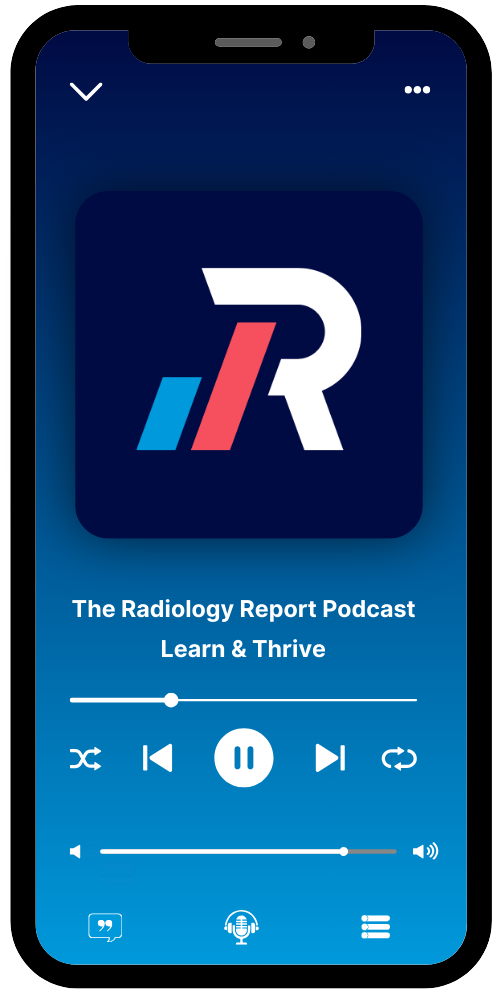The crowd went wild! Back by popular demand! Presenting: the encore post! It seems there is an appetite for learning from other people’s “wish I had knowns.” My first post (Janni add link) on this topic was so popular that some of you asked me for a “part 2” and shared some of your own regrets. I’ve included those and others that I’ve accumulated from listening to colleagues and reading blog posts and forums. Because, uh yeah, it really is way better to learn from other people’s failures and mistakes. So, by request, your wish for more “wish I’d knowns” is granted. As with the first post, this follow-up includes what radiologists wished they’d known as a medical student or resident—but, plot twist—also, what they wish they’d known as a junior practicing radiologist.

Here’s what they said: I wish I’d…
…Started a taxable brokerage account earlier
After exhausting all tax-sheltered options, of course. A “taxable” account is one that allows an investor to deposit funds and buy and sell investments, but as the name suggests, it is not a tax-qualified retirement account. You get no tax deduction on the money that is deposited and earnings do not grow tax free. However, qualified dividends and funds that are sold after being held for over a year are subject to a long-term capital gains tax rate, which is generally lower than a person’s ordinary income tax rate.
Taxable accounts offer many flexible features: 1) there are no IRS restrictions or penalties for withdrawal (although the custodian or investment provider may apply fees), 2) there are no required minimum distributions, 3) they may be set up as individual or joint accounts (retirement accounts are individual only), 4) there is no contribution limit, and 5) if you should pass away with money in your taxable account, your heirs will receive the investments with what’s called a step-up in basis. This means when your heirs eventually sell the investments, they will be taxed as if they bought them for what they were valued on the day you died, not at the price you bought them. You didn’t pay capital gains on the growth portion of the portfolio, and now your heirs won’t either as they reap the benefits of a stepped-up basis.
By investing in lower-income generating funds (e.g., low turnover broadly diversified stock index funds and municipal bond funds), taking advantage of tax-loss harvesting opportunities, and making charitable donations, you can maximize the tax efficiency of a taxable account.
…Started an emergency fund
Remember Aesop’s fable “The Ant and the Grasshopper”? One summer day, while watching an ant toil away taking corn to its nest, a Grasshopper was hopping about, chirping and singing to its heart’s content. He asked the ant to play with him, but the Ant said he was too busy laying up food for winter. The Grasshopper replied that “he had plenty of food now.” When winter came the Grasshopper had no food and found itself dying of hunger, while it saw the ants distributing corn and grain from the stores they had collected in the summer.
Moral: It is best to prepare for the days of necessity.
Personal Finance Lesson: No matter your present financial situation, you need an emergency fund. Your “winter” will be in the form of a job loss, medical emergency, or a home repair. Plan for these emergencies today by saving at least 3-6 months worth of expenses.
Many people resort to using a credit card to pay for unexpected expenses when they don’t have access to any savings. Having an emergency fund helps avoid credit card debt by providing the cash needed when an emergency arises.
…Watched out for lifestyle creep
It’s just as easy to buy too much car, too much house, and too much vacation when making $427,000 a year (average radiologist salary) as it is when making $64,600 a year (average radiology resident salary). One practicing radiologist offered this advice: “Live like a resident, on a budget, for a few years out of training. It’s much harder to dial down than dial up slowly.”
…Started investing sooner
Albert Einstein is reputed to have said, “Compound interest is the eighth wonder of the world. He who understands it, earns it; he who doesn’t, pays it.” To understand this is to understand the “time value of money”, meaning that money today is not worth what it will be in the future. If money is invested, it can grow and compound. Saving early gives $ more time to grow compared with starting late.
If a 26-year-old radiology resident invests $6,000 in a Roth IRA, earning 8% per year during 6 years of residency/fellowship, the account will total $44,025 at the age of 32. Even if that resident never invests another penny but continues to earn 8% per year, by age 40 the account will be worth $77,802. By age 50 the account will be worth $167,968, and by age 67 it will be worth $532,823.
If a 32-year-old newly graduated radiologist begins investing $60,000 a year and earns 6% per year (a conservative return for a portfolio of mixed stock and bond funds), by age 40 the account will total $689,589. By age 50 it will total $2,025,923 and by age 65 a whopping $6,252,023. If that radiologist waits until age 40 to start investing, the account will total $3,549,950 by age 65. In other words, waiting 8 years to start investing results in an account at age 65 worth only about half as much. And waiting until age 50 to start investing will result in an account worth only $1,540,598 at age 65.
…Kept investments simple
The easiest option for investing is to own a “lifecycle” or “target-date” fund, which is a diversified mutual fund that automatically shifts towards a more conservative mix of investments as it approaches a particular year in the future, known as its “target date.” It’s easy to identify a lifecycle fund because its name will likely refer to its target date. For example, you might see lifecycle funds with names like “Portfolio 2015,” “Retirement Fund 2030,” or “Target 2045.”
Another easy to manage and widely praised portfolio consists of three funds (“three fund portfolio”): 1) total stock market index fund, 2) total international stock market index fund, and 3) total bond market index fund. This portfolio is not only easy, but minimizes risk through broad diversification, doesn’t require having to try to pick the best stocks or mutual funds, and is low cost.
…Used a fee-only advisor, then learned to do it on my own
A radiologist with regret said the following: “I wish I’d learned about finances earlier, not relied on advisors, and not trusted my buddy-turned-crook/financial advisor who charged me 6%.” It’s been estimated that as many as 80% of physicians need, want, and should use a financial planner or investment manager, either because they don’t know enough to manage their finances on their own or they don’t have/want to spend the time to do it themselves. Often it’s both. The key is getting good advice at a fair price. And only by becoming at least minimally financially literate will you be able to judge either.
If paying an advisor means you won’t make poor financial decisions, costing you hundreds of thousands of dollars or more over your lifetime, then paying for advice would be a better option than going it alone. I suggest paying only for the advice you value and need, and not paying any more for it than you need to. And stick with someone who has the fewest conflicts of interest, is transparent about those conflicts, who will help you become financially literate, and is a fiduciary who is legally bound to act in your best interest.
…Made a simple will
I got this one from a seance. A message from beyond the grave. Okay, I’m joking, but a little assurance (i.e. a will) that allows your spirit to rest easy is a good thing. I’ll go one step further and suggest that you should engage in estate planning, and do so earlier rather than later. A will is just one part of an estate plan. You may assume that if you have a negative net worth (as is the case with many newly graduated radiologists who carry, on average, $200,000 in student loan debt), that you don’t have to worry about having a will or other estate planning documents. But estate planning refers to more than the management of how assets will be transferred to beneficiaries when an individual dies.
If you have any minor children you need to clarify how they will be provided for if something happens to you. Having an estate plan can also minimize the assets that go through the probate process, potentially reduce estate taxes, and clarify who will make medical and financial decisions on your behalf if you become temporarily or permanently incapacitated. Once you have an estate plan, you will need to revisit it when major changes occur in your life (e.g., death of an heir, death or incapacitation of a named power of attorney or executor, marriage, divorce, death of a spouse, significant purchase, or inheritance). Aside from a major pandemic there are all manner of other possible catastrophic events that could occur that might make you wish you hadn’t put off estate planning. The future is uncertain.
…Gotten a prenup
A prenuptial agreement is a contract created by two people before entering into marriage. They usually dictate that each partner will retain any property that he or she brought into the marriage in the event of a divorce, provide guidelines on how property acquired during the marriage will be divided in a divorce, contain language on responsibility for debts acquired before and during the marriage, and outline spousal support in the event of divorce. Prenups can be particularly important when older couples enter marriage with significant assets that they want to leave to children from a prior marriage. Each state has its own laws regarding the enforcement and validity of prenuptial agreements. In most states, the agreement has to be fair, the parties have to fully disclose their assets, and the parties each need their own attorney.
Finances are a major source of marital discord, which can be mitigated by having frank and open discussions about how money will be managed prior to the wedding. This would be a good time to talk about a prenup since courts generally take a dim view of prenups that are sprung on a spouse on or near the wedding day (now, I’m not calling anybody a golddigger…).
I think of a prenup as marriage insurance. Divorce can be a financial catastrophe for many radiologists and a prenup can soften the blow by ensuring that each party is treated fairly. Divorce is also a time when emotions are running high – not the best time for making important financial decisions.
…Started an HSA when it was offered the first time
A practicing radiologist offered this advice on social media: “If you can afford medical costs out of pocket now, just keep your receipts and take withdrawals in the future.”
Often referred to as a “stealth IRA”, a health savings account (HSA) is available to anyone who has a qualified high-deductible health insurance plan (HDHP) and is not enrolled in Medicare. In 2021 you can contribute up to $3,600 for self-only coverage and up to $7,200 for family coverage into an HSA. There is also a $1,000 catch-up contribution limit for those aged 55 and older. Because neither the contributions, nor earnings, nor qualified distributions are taxed, it is called a “triple-tax-free” account.
There are numerous benefits of an HSA:
- You can claim a tax deduction for contributions you, or someone other than your employer, make to your HSA even if you don’t itemize your deductions on your income taxes
- Contributions to your HSA made by your employer may be excluded from your gross income
- The contributions remain in your account until you use them
- The interest or other earnings on the assets in the account are not taxed
- Distributions are tax free if used to pay for qualified medical expenses
- An HSA is “portable”; it stays with you if you change employers or leave the workforce
- There is no rule requiring that the money must be withdrawn from the HSA in the same year the qualified medical expense incurred; you can keep your receipts for qualified unreimbursed medical expenses and take the money out of the HSA to cover those costs at any time in the future

…Understood that the future I spend so much time planning for is not guaranteed
It’s true, you can’t control your future. Banana peels are out there. But you can shape it. Exercise, healthy diet, adequate sleep, and minimal stress can all up the odds of a longer, healthier life. But they don’t guarantee it. Leaning on supportive family, friends, and colleagues can help smooth out life’s challenges but not eliminate them. You can, however, exercise greater control over your finances. Planning for financial security not only opens up your future to more possibilities but takes some of the stress off of living today.



